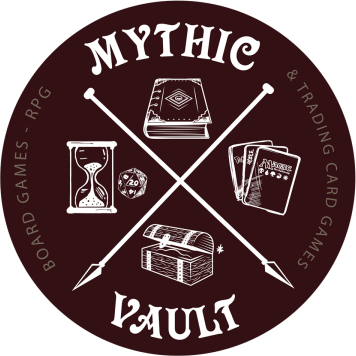How many times have you shivered at the sound of the epic voice of a wise elder or storyteller as they describe the scenario of the fantasy title you’re engaged with? How many times do you remember yourself literally living in another world, far from the worries and problems of everyday life, where the challenges involve orc raids or how to acquire the legendary treasure of an ancient dragon?
 The bond unintentionally created between you and the hero, who is simultaneously the protagonist of the respective RPG, makes the whole experience unprecedented and unique. Often, your emotions change throughout the adventure, and many times you find yourself rejoicing in the joy of your hero when they find a piece of mythical armor or when they achieve the coveted level up.
The bond unintentionally created between you and the hero, who is simultaneously the protagonist of the respective RPG, makes the whole experience unprecedented and unique. Often, your emotions change throughout the adventure, and many times you find yourself rejoicing in the joy of your hero when they find a piece of mythical armor or when they achieve the coveted level up.
 At other times, anger takes over when death and the loading screen repeatedly appear on your monitor. The references are numerous, one of the most widespread being the experience in the perpetually frozen land of Skyrim in online games. Similar moments, of course, have been provided by many other titles over time, such as the unforgettable Baldur’s Gate, Icewind Dale, Temple of Elemental Evil, Neverwinter Nights, Planescape: Torment, Witcher, Gothic, Dragon Age, etc. But what do all these titles have in common? Besides belonging to the same category of fantasy RPG, their common element is none other than Dungeons and Dragons, or simply D&D. I’m referring, of course, to the tabletop pen and paper game that has been around for almost 45 years!
At other times, anger takes over when death and the loading screen repeatedly appear on your monitor. The references are numerous, one of the most widespread being the experience in the perpetually frozen land of Skyrim in online games. Similar moments, of course, have been provided by many other titles over time, such as the unforgettable Baldur’s Gate, Icewind Dale, Temple of Elemental Evil, Neverwinter Nights, Planescape: Torment, Witcher, Gothic, Dragon Age, etc. But what do all these titles have in common? Besides belonging to the same category of fantasy RPG, their common element is none other than Dungeons and Dragons, or simply D&D. I’m referring, of course, to the tabletop pen and paper game that has been around for almost 45 years!
For many, D&D is the father of all fantasy RPGs, whether tabletop or video games.
D&D is the first game that first delved into a fantasy world that later became a permanent residence for many of us. Since then, it has been a source of inspiration for countless RPGs, some more directly influenced than others, but always with a common reference in terms of design and ideology to the world of Forgotten Realms.
 If you look into a Monster Manual handbook of D&D, they will see that many monster designs have been recreated in various games, without this being a negative thing. For many, the idea of a creature that always existed on paper or in each individual’s imagination taking on flesh and bones on a screen is appealing. And for you, who prioritize exploration as the primary goal, open-world RPGs generously offer you the opportunity to spend endless hours admiring landscapes with the “print screen” key permanently pressed on your keyboard. Imagine a place that comes to life solely through the descriptions of an author or a Dungeon Master, unfolding before you, and you being a part of it through the eyes of your hero.
If you look into a Monster Manual handbook of D&D, they will see that many monster designs have been recreated in various games, without this being a negative thing. For many, the idea of a creature that always existed on paper or in each individual’s imagination taking on flesh and bones on a screen is appealing. And for you, who prioritize exploration as the primary goal, open-world RPGs generously offer you the opportunity to spend endless hours admiring landscapes with the “print screen” key permanently pressed on your keyboard. Imagine a place that comes to life solely through the descriptions of an author or a Dungeon Master, unfolding before you, and you being a part of it through the eyes of your hero.
So it is reasonable to say that D&D has left a tremendous legacy for many fantasy titles, whether they have been released or are yet to come, inevitably inviting comparisons from many fans of the genre. It is important to note here that we have seen exceptional work from companies that present their own world and story, without having anything to envy from the world of D&D.
A striking example is Bethesda with the Elder Scrolls series. On the other hand, titles like the renowned Forgotten Realms series fully simulate the world and combat system of D&D. From the names of landscapes, cities, and characters, to the actual turn-based battles and the d20 dice system, just like in a pen and paper D&D session. This, of course, makes it quite challenging for novice players who have no experience with similar games, but it is particularly beloved by hardcore fans of the genre.
 Of course, it would be unfair to make a real comparison between D&D itself and a video game, which is why I only emphasize the influences and commonalities that may exist. The reason is simple. The dozens of books with their vast database, combined with the imagination of the DM and the players surrounding a session, make D&D a unique experience for anyone. Essentially, nothing is impossible in a fantasy world, unlike an RPG game that, no matter how open-world it may be, will always have some limitations. Certainly, we don’t know what the future holds as technology is constantly evolving. But even then, the possibility of direct and human communication, whether in the form of emotions or through live role-playing, always takes the live D&D session one step forward.
Of course, it would be unfair to make a real comparison between D&D itself and a video game, which is why I only emphasize the influences and commonalities that may exist. The reason is simple. The dozens of books with their vast database, combined with the imagination of the DM and the players surrounding a session, make D&D a unique experience for anyone. Essentially, nothing is impossible in a fantasy world, unlike an RPG game that, no matter how open-world it may be, will always have some limitations. Certainly, we don’t know what the future holds as technology is constantly evolving. But even then, the possibility of direct and human communication, whether in the form of emotions or through live role-playing, always takes the live D&D session one step forward.
Currently, D&D is in its fifth edition.
However, there are still many people who engage with the 3.5 edition.
The books available for each edition are truly numerous, ranging from monster manuals and player handbooks to rulebooks, campaign settings, and guides for the DM themselves.
As you can imagine, the list is huge and continues to grow. Additionally, for those of you who want to delve even deeper into the world of D&D and Forgotten Realms, you can read the literature of internationally acclaimed fantasy author R.A Salvatore.
 This is where our session comes to an end.
This is where our session comes to an end.
Perhaps someday we will meet as allies and fight together in a fantasy world, where only we know how to survive. Until then, be cautious and avoid the darkest places, because, who knows, a Drow Elf might be lurking there, waiting for your arrival…










